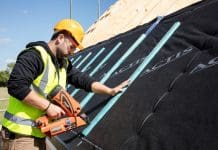Beattie Passive has completed the UK’s first large-scale demountable and relocatable modular net zero housing development, offering a solution for homeless families in Cardiff
The volumetric modular net zero housing development has been constructed to the standards of the ‘Passivhaus Plus’ certification on the site of a former gasworks in Grangetown.
The development achieved net zero with photovoltaic panels and by maximizing heat efficiency
Constructed using a sustainable timber-frame build system, the volumetric modular net zero homes at Ferry Road maximise airtightness and minimise thermal bridging to reduce energy consumption by up to 90%.
The blocks are also equipped with photovoltaic panels. In effect, each home at Ferry Road produces as much energy as it consumes, reducing the risk of families falling into fuel poverty.
Properties certified to the Passivhaus Plus standard must incorporate renewable energy. According to the Passivhaus Trust, a building certified to the Passivhaus Plus standard not only dramatically reduces energy consumption, but also produces enough energy from renewable sources to operate the building throughout the year.
Ron Beattie, Founder and Managing Director of Beattie Passive, said: “As fuel costs soar and climate concerns intensify, we must urgently address the issues of energy efficiency and carbon in construction.
“The project at Ferry Road ticks all the boxes for a contemporary social housing scheme and then goes further still to achieve Passivhaus Plus standards of energy efficiency, comfort and carbon-saving.”
Reaching Cardiff’s carbon targets and providing a flexible solution to homelessness
Cardiff Council has committed to becoming a carbon-neutral city by 2030 through its ‘One Planet Cardiff’ strategy.
A whole life carbon assessment, conducted by construction industry analyst Cercula, calculated that the housing development at Ferry Road would save 8,880 tonnes of carbon – with 85% less whole life carbon (33 tonnes vs 218 tonnes per home) compared to a traditional build – equivalent to 20,640 barrels of oil.
The volumetric modular net zero scheme at Ferry Road is comprised of forty-eight volumetric one, two and three-bedroom modular apartments and two large ancillary blocks and has been designed as a ‘meanwhile’ housing solution to provide temporary accommodation for families experiencing homelessness.
Cardiff Council is providing wraparound services and support for residents. The site boasts an office block for staff, a training room, a training kitchen, a 24/7 medical office and a crèche.
Commenting, Councillor Lynda Thorne, cabinet member for Housing and Communities at Cardiff Council, said: “The flexibility of this fully demountable system means they can be moved elsewhere in the future if required, enabling us to respond to changing housing needs over time.”














